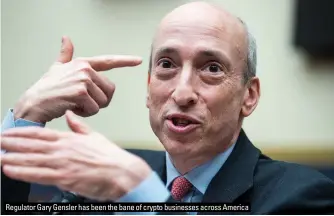“Welcome to the crypto bull market,” declares Gautam Chhugani of Bernstein. With Bitcoin prices surging by more than a third since Donald Trump’s election victory, the cryptocurrency nearly breached the $100,000 mark for the first time over the weekend. This dramatic rise signals a pivotal moment for digital assets, as investors anticipate a friendlier regulatory environment under Trump’s leadership.
One major shift on the horizon is the imminent departure of Gary Gensler, chair of the U.S. Securities and Exchange Commission, who has been a formidable figure in the crypto world. “Gensler has been the bane of crypto businesses in America and across the world,” says Glen Goodman, author of The Crypto Trader. His departure, scheduled for January, has buoyed crypto enthusiasts and fueled optimism about the future of the industry.
Defying the Doubters
Bitcoin, launched in 2009, has often been dismissed as a fleeting trend. “It has been declared ‘finished’ hundreds of times,” notes Julien Romon in Les Echos. Yet the digital asset has consistently rebounded, amassing a market capitalization of $1.8 trillion—more than Meta, the parent company of Facebook, and just behind Google. Despite criticism that Bitcoin lacks traditional utility—such as the ability to buy coffee or pay taxes—it has become a financial force too significant to ignore.
Katie Martin of the Financial Times describes Bitcoin’s rise as a “serious struggle” for skeptics. “The industry is dominated by cranks and grifters,” she observes, yet Trump’s support signals a “big-bang moment” for cryptocurrency, making it increasingly difficult to resist what she calls the “crypto revolution.”
Volatility and Caution
Despite its meteoric rise, Bitcoin’s pricing remains notoriously volatile. Between November 2021 and November 2022, Bitcoin lost 75% of its value. Financial experts continue to advise caution. “Before you invest in Bitcoin… ask yourself if it were to drop 50%, would you be left in a pinch?” warns Trent Porter of Priority Financial Partners.
Even so, institutional acceptance is growing. While U.S. wealth managers, such as Mike Turi of Upbeat Wealth, recommend modest portfolio allocations of 3%, this marks a significant shift from the past when cryptocurrencies were largely dismissed. BlackRock’s U.S. Bitcoin exchange-traded fund (ETF) recently surpassed the value of its gold ETF, further cementing crypto’s growing legitimacy.
A Divided Landscape
While America embraces digital assets, Britain lags. Andrew Orlowski of The Telegraph laments that UK investors remain limited to buying Bitcoin through unregulated platforms. Meanwhile, a defined-benefit pension scheme in the UK reportedly turned a profit by dabbling in Bitcoin—a move critics argue undermines the stability pensioners rely upon.
As the crypto revolution gathers pace, Bitcoin’s role in global finance appears poised to grow. Whether hailed as a financial innovation or critiqued for its volatility, one thing is certain: Bitcoin’s journey is far from over.

